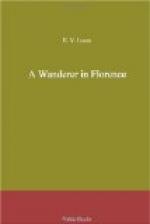But this is going too fast. In 1300, when Dante was thirty-five, he was sufficiently important to be made one of the six priors of the city, and in that capacity was called upon to quell a Neri and Bianchi disturbance. It is characteristic of him that he was a party to the banishment of the leaders of both factions, among whom was his closest friend, Guido Cavalcanti the poet, who was one of the Bianchi. Whether it was because of Guide’s illness in his exile, or from what motive, we shall not know; but the sentence was lightened in the case of this Bianco, a circumstance which did not add to Dante’s chances when the Neri, having plotted successfully with Charles of Valois, captured supreme power in Florence. This was in the year 1301, Dante being absent from that city on an embassy to Rome to obtain help for the Bianchi. He never came back; for the Neri plans succeeded; the Neri assumed control; and in January, 1302, he was formally fined and banished. The nominal charge against him was of misappropriating funds while a prior; but that was merely a matter of form. His real offence was in being one of the Bianchi, an enemy of the Neri, and a man of parts.
In the rest of Dante’s life Florence had no part, except in his thoughts. How he viewed her the “Divine Comedy” tells us, and that he longed to return we also know. The chance was indeed once offered, but under the impossible condition that he should do public penance in the Baptistery for his offence. This he refused. He wandered here and there, and settled finally in Ravenna, where he died in 1321. The “Divine Comedy” anticipating printing by so many years—the invention did not reach Florence until 1471—Dante could not make much popular way as a poet before that time; but to his genius certain Florentines were earlier no strangers, not only by perusing Ms. copies of his great work, which by its richness in Florentine allusions excited an interest apart altogether from that created by its beauty, but by public lectures on the poem, delivered in the churches by order of the Signoria. The first Dante professor to be appointed was Giovanni Boccaccio, the author of the “Decameron,” who was born in 1313, eight years before Dante’s death, and became an enthusiast upon the poet. The picture in the Duomo was placed there in 1465. Then came printing to Florence and Dante passed quickly into his countrymen’s thoughts and language.




